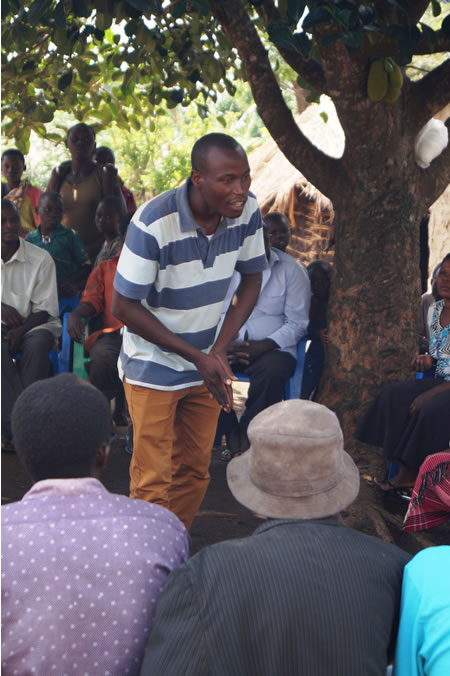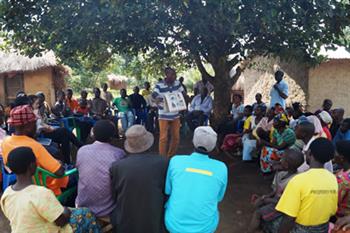
Bukinda village members receive training from Pharaoh on how to prevent malaria transmission in their homes.
Kasyonga Pharaoh is a 29-year-old voluntary community health worker with almost a decade of experience in Bukinda, a village in mid-western Uganda. Community members flock to his home to consult him when their children fall ill. In Uganda, where many people live far from health clinics and hospitals, frontline health workers like Pharaoh are often the first, and sometimes only, providers of health services like diagnosing and treating malaria.
A well-trained health workforce is essential to achieving PMI’s objectives and goal, which is why the U.S. President’s Malaria Initiative supports the training, equipping, and supervising of community health workers and the health facility staff who support them. Building the capacity of healthcare workers at both community and facility levels has been a priority for PMI support in all focus countries.
In Uganda, Pharaoh has been trained by Malaria Consortium as part of USAID’s Malaria Action Program which increases district capacity to diagnose and treat children for malaria, pneumonia and diarrhea or refer them to the nearest hospital when the illness is severe.
Beyond testing, treating, and referring patients to health clinics, community health workers also increase demand for services. After completing his home visits, Pharaoh organizes and conducts a village health club meeting with the community where key health issues are discussed. Here we see Pharaoh advising his fellow community members on how to prevent malaria, so that they chase malaria out of their homes. “They have to focus on the lives of their children, because they are the generation of tomorrow,” Pharaoh says.
Uganda is making progress, the prevalence of malaria in children under five decreased from 55 percent in 2009 to 30 percent in 2016. The National Malaria Control Programme wants to reach seven percent prevalence by 2020 and to be able to fully eliminate malaria by 2030. In order to make this happen, the country’s health system has to ensure that health services are accessible to communities and referrals happen when needed. Pharaoh is contributing to this change.

